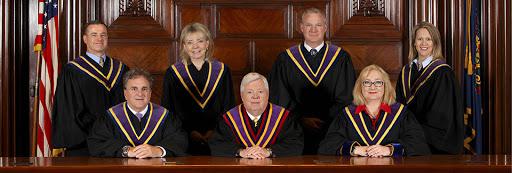Guest
Guest
 |  Subject: Pennsylvania Supreme Court Dismisses GOP-Trump Win; Next Stop, US Supreme Court Subject: Pennsylvania Supreme Court Dismisses GOP-Trump Win; Next Stop, US Supreme Court  Sun Nov 29, 2020 10:46 am Sun Nov 29, 2020 10:46 am | |
| https://www.zerohedge.com/political/pennsylvania-supreme-court-dismisses-gop-trump-win-next-stop-us-supreme-court
Pennsylvania Supreme Court Dismisses GOP-Trump Win; Next Stop, US Supreme Court

[size=10]by Tyler Durden
Sun, 11/29/2020 - 10:00The Pennsylvania Supreme Court on Saturday evening dismissed a lawsuit brought by Republicans who seek to invalidate the state's mail-in ballots, with five of the court's seven judges arguing that the case should be dismissed because the challenge had come too late, according to the Financial Times.
[url=https://www.zerohedge.com/s3/files/inline-images/pa supremes.jpg?itok=7oALtqdG] Pennsylvania Supreme Court[/url] Pennsylvania Supreme Court[/url]
[/size] - Quote :
- The latest Pennsylvania lawsuit, led by Republican congressman Mike Kelly, was unanimously rejected by the state’s Supreme Court judges, who described it as an “extraordinary proposition that the court disenfranchise 6.9 million Pennsylvanians who voted in the general election”.
...
The court’s decision overturns an earlier hold on the state’s certification process made by Commonwealth Court judge Patricia McCullough. -FT [size][size] Saturday evening's ruling was dismissed with prejudice, meaning it cannot be refiled. We expect the plaintiffs to follow the same course as Trump's legal team, which has vowed to take their various cases to the Supreme Court.What happens next? (from John M. Reeves via uncoveredc.com)If other lawsuit litigation is any predictor, Parnell and the other voters will now seek an expedited petition for a writ of certiorari. They will most likely also apply to Justice Alito—as Circuit Justice for the Third Circuit—for an emergency injunction barring the Pennsylvania Secretary of State from certifying the results of the election pending resolution of the cert petition. To obtain the Court’s review, Parnell and the other voters must show that the Pennsylvania Supreme Court’s decision somehow violates federal law. While the Pennsylvania Supreme Court’s decision is rooted in state law, a good argument can be made that it involves a federal question.
In interpreting the legislative power within the context of selecting Presidential Electors, the Supreme Court of the United States has held, “What is forbidden or required to be done by a state is forbidden or required of the legislative power under the state constitutions as they exist.” McPherson v. Blacker, 146 U.S. 1, 25 (1892). In other words, the “legislative power” to select Presidential Electors includes those limitations that state constitutions place on its legislatures—in this case, the Pennsylvania state constitution’s limiting of absentee voting to the above five situations. [(1) work; (2) illness; (3) physical disability; (4) the election occurring on a religious holiday; or (5) a person’s election-day duties themselves preventing the person from voting in person.] This may constitute a viable federal question for the Supreme Court of the United States to intervene. And while McPherson dates from 1892, its rationale is sound, and the Court has cited it as recently as 2015. See Ariz. State Legislature v. Ariz. Indep. Redistricting Comm’n, 576 U.S. 787, 839 (2015).
The other question is what weight, if any, the Supreme Court of the United States will give to Parnell’s supposed delay in bringing the lawsuit. I will admit that this is an area I have not examined much, and so I will refrain from commenting on it for the time being. But this much, at least, seems clear to me: the Pennsylvania mail-in voting law is unconstitutional.* * *Saturday's ruling is the latest 'setback' for Republicans in Pennsylvania - however reaching the US Supreme Court has always been the goal, achieved through appeals of lower court decisions such as Saturday's.Last weekend, Republicans were dealt a blow in their efforts to overturn the election results after Judge Matthew Brann dismissed a lawsuit seeking to block certification of Joe Biden's win in the state - calling the case unconstitutional and lacking evidence.The Trump Campaign's appeal of Brann's decision was then dismissed on Friday by a panel of Republican-appointed judges."Free, fair elections are the lifeblood of our democracy. Charges of unfairness are serious. But calling an election unfair does not make it so. Charges require specific allegations and then proof. We have neither here," wrote Third Circuit Court of Appeals Judge Stephanos Bibas, a Trump appointee.[/size] [/size] |
|





